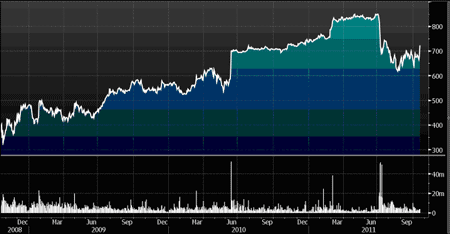What’s new at BskyB?
First–quarter sales have surged by 9% (to £1.66bn) compared with last year. But the growth has come from selling more stuff to existing subscribers rather than adding new customers.
BSkyB managed to add just 26,000 new pay-TV customers in the quarter, taking the total subscriber base to 10.2m, well down on the near-100,000 added in the same period last year.
Yet the company still managed to sell 683,000 products to customers in the three months to the end of September. This has widened margins, lifting adjusted operating profit by 16% to £295m and earnings per share (eps) by 23%. Adjusted free cash flow – essentially what the firm has left over once non discretionary payments are made – is 39% higher at £96bn. “Our financial performance is accelerating”, says BSkyB boss Jeremy Darroch”.
The shares have jumped 7% on today’s news.
Is the outlook this healthy too?
Not quite. “Pressures facing consumers in Ireland” and “acute” strains on British household budgets, says Darroch, mean that “TV is proving a bit more challenging”. So growth in TV subscriptions will be “harder to come by in the next few quarters. But we’re compensating for that well with the growth in broadband”.
And what about the News Corp bid?
Earlier this year, BSkyB was on the brink of being taken over by its largest shareholder News Corporation, which has a 39% stake. But the News of the World phone-hacking scandal scuppered the deal. And no new takeover bid is likely to appear for a good long while – if ever.
What’s the firm’s history?
BSkyB is the largest pay-TV broadcaster in the UK and Ireland. It supplies news, films, entertainment and sports channels as well as pay-per-view events, internet and telecoms services.
Sky began with four free-to-air TV channels via satellite in 1989. BSkyB was formed a year later as subscription services started. Sky Sports kicked off in 1991, and a £304m deal for exclusive live coverage of the new FA Premier League was signed soon afterwards.
In 1994, 17% of the company was floated on the UK and US stock exchanges. Fast growth in both the quantity of channels provided and subscriber numbers followed, with HD (high definition) and broadband packages being offered in 2006.
Who runs BSkyB?
CEO since 2007 is Jeremy Darroch, formerly the firm’s top finance man. Last year he took home £2.7m – including a £1.7m bonus – a 15% rise on the previous year. Current chief financial officer is ex-Rothschild investment banker Andrew Griffith, who got £1.24m, 17% more than before. But the base salaries of both men “remain below market levels”, says BSkyB’s remuneration committee. Chairman and former CEO is James Murdoch, son of media mogul Rupert Murdoch.
The analysts

(Source: Bloomberg)
Of 28 analysts surveyed by Bloomberg, over two-thirds are bulls, 25% say ‘hold’ and just 7% ‘sell’. The average price target is almost 10% above today’s 722p.
Our view: in May we rated the stock “fully valued on the fundamentals”. The price has since dropped by 15%. But on a current year p/e of nearly 15 and a 3.5% prospective yield, BSkyB still hasn’t fallen far enough to become cheap. With the consumer scene set to stay difficult, we’re prepared to take a contrary view to the bullish consensus. There are better bets elsewhere.
Category: Economics

